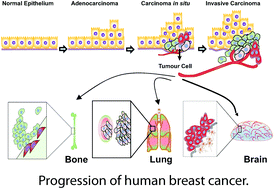Advancement of mass spectrometry-based proteomics technologies to explore triple negative breast cancer
Abstract
Understanding the complexity of cancer biology requires extensive information about the cancer proteome over the course of the disease. The recent advances in mass spectrometry-based proteomics technologies have led to the accumulation of an incredible amount of such proteomic information. This information allows us to identify protein signatures or protein biomarkers, which can be used to improve cancer diagnosis, prognosis and treatment. For example, mass spectrometry-based proteomics has been used in breast cancer research for over two decades to elucidate protein function. Breast cancer is a heterogeneous group of diseases with distinct molecular features that are reflected in tumour characteristics and clinical outcomes. Compared with all other subtypes of breast cancer, triple-negative breast cancer is perhaps the most distinct in nature and heterogeneity. In this review, we provide an introductory overview of the application of advanced proteomic technologies to triple-negative breast cancer research.


 Please wait while we load your content...
Please wait while we load your content...